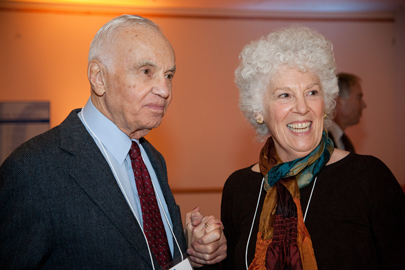Mandel Center celebrates 10th anniversary with colloquium
Past, present and future of Jewish education addressed

Morton Mandel, who was honored at the Mandel Center for Studies in Jewish Education anniversary celebration, talks with Sharon Feiman-Nemser, the center's director.
Educators should be able to work in “environments where learning is part of the work: learning the craft of teaching, learning the basic skills of running an organization, and deep, meaningful compelling Jewish learning,” Baker said. “If we’re not actively constructing our own Jewish identities and living engaged Jewish lives, there is no way we’ll be able to transmit it to the next generation we’re trying to inspire.”
The colloquium was an occasion to revisit “A Time to Act,” the groundbreaking 1990 report of the Commission on Jewish Education in North America. Initiated by Morton Mandel, for whose family the Mandel Center is named, the Commission issued a set of recommendations that have helped shape the Jewish educational agenda of the past 20 years.
Baker spoke on a panel with other leaders of innovative Jewish education organizations that are making a difference in the field today. Speaking to an audience of more than 100 educators, funders, policy makers and scholars, they considered what kinds of initiatives are needed now to keep Jewish education vital and meaningful for the future.
They followed a group of educational leaders who considered the impact of “A Time to Act” on their own work over the past 20 years. As Alisa Rubin Kurshan, vice-president for strategic planning for UJA-Federation of New York, noted, the report “put Jewish education on the communal map as a legitimate philanthropic activity. So many of today’s most important initiatives stem from that effort.”
One of those initiatives was the Mandel Center itself; Lee Shulman, professor emeritus at the Stanford University School of Education called the center “the most visibly successful of the responses to ‘A Time to Act.’” The Center was established as a partnership between the Mandel Foundation and Brandeis to carry out the report’s recommendations for creating a “theoretical and practical knowledge base” and “settings where scholars and practitioners can think together systematically about the goals, the content, and the methods of Jewish education.”
Since it was established in 2002, the Center has carried out programs of research with both scholars and practitioners in the field, designed and tested innovative educational models, and provided professional preparation and development programs for educators. The first book to emerge from the Center’s research, “Turn it and Turn it Again: Studies in the Teaching and Learning of Jewish Texts,” will soon be published.
At the celebratory dinner that followed the colloquium, President Fred Lawrence honored Morton and Barbara Mandel and the Mandel family for their support of the Center’s work.
“It is still a time to act,” he said, “and we are honored to be partners in the task. We are honored with the responsibility we take on with the important role of the Center for years and years to come.”
Sharon Feiman-Nemser, director of the Center, noted the Mandel Foundation’s commitment to the Center over the years, in an environment where “too often funders view continuity as sameness, and prefer to fund innovations. The Mandel family has shared our belief that serious study takes time, and that it can lead to purposeful and meaningful action.”
“We get a big return on our investment,” Morton Mandel noted in his remarks. “That we are able to change the world is a very important source of fulfillment for us.”
Categories: Humanities and Social Sciences





